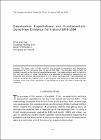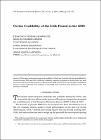Browsing by Subject "European Monetary System"
Now showing items 1-14 of 14
-
A systems-approach to modeling the EMS exchange-rate mechanism
(Economic & Social StudiesDublin, 1989)This paper examines the extent to which the EMS has succeeded in stablising intra-European exchange rates from external influences. It generalises earlier results by developing a systems approach to the problem which enables ... -
Devaluation expectations and fundamentals: some new evidence for Ireland 1979-1994
(Economic & Social StudiesDublin, 2001)This paper uses a Probit model to link economic fundamentals with devaluation expectations for the Irish pound over the period 1979-1994. The estimates relate to both the probability as well as the size of an expected ... -
Devaluation expectations for the IR#/DM in the EMS: some empirical estimates and their relation to fundamentals
(Economic & Social StudiesDublin, 1995)This paper presents results for devaluation expectations for the IR#/DM for the period of EMS membership. The methodology employed produces estimates of expected rates of devaluation by adjusting the interest rate ... -
EMS 10th anniversary issue - introduction
(Economic & Social StudiesDublin, 1989)The European Community is frequently accused of being short on tangible achievements. Consequently, it seemed obvious to the editors of the Review that the 10th anniversary of the EMS was an occasion worthy of note. The ... -
The EMS: Ireland's experience and prospects
(Statistical and Social Inquiry Society of Ireland, 1981)Economists argue about the relative merits of fixed and floating exchange rates and, in particular, about which is more conducive to efficient stabilisation policy; most would agree, however, that exchange-rate stability ... -
IMS, EMS, and the (n-1) problem
(Economic & Social StudiesDublin, 1989)Three types of exchange rate regimes predominate the present international monetary system (IMS): the managed float by industrialised countries, a fixed but adjustable peg inside the European Monetary System (EMS), and in ... -
Ireland and the European Monetary System
(Statistical and Social Inquiry Society of Ireland, 1981)It is now 19 months since Ireland began its membership of the European Monetary System. To the man in the street the record of those months is a standing warning not to listen to the advice of economists on important matters ... -
The Irish pound in the EMS
(Statistical and Social Inquiry Society of Ireland, 1981)On the 13th June 1980, the Central Bank of Ireland ended the transitional arrangement for the Irish pound in the EMS and allowed the pound to float up to the maximum permitted margins of the EMS. The pound is now in the ... -
Is the EMS a DM zone - evidence from the realignments
(Economic & Social StudiesDublin, 1989)Most analysis of the relative importance of different countries in the EMS has focused on the interaction of monetary policies. This paper addresses more directly the interdependence of exchange markets. Guided by the ... -
On the credibility of the Irish pound in the EMS
(Economic & Social StudiesDublin, 2000)This paper assesses the degree of credibility of the Irish Pound in the European Monetary System between 1983 and 1997. Different credibility indicators proposed in the literature are used to measure agents? perceptions ... -
Price determination in Ireland - effects of changes in exchange-rates and exchange-rate regimes
(Economic & Social StudiesDublin, 1989)This paper finds that the wholesale price of Irish manufacturing output is closely tied to foreign prices in the long run; domestic wage costs generally do not exert a significant influence. In the short run changes in ... -
Real exchange-rates, co-integration and purchasing power parity - Irish experience in the EMS
(Economic & Social StudiesDublin, 1989)Dickey-Fuller and Co-Integration techniques are used to test the hypothesis that co-movements in Irish nominal exchange rates and relative prices are consistent with the implications of Purchasing Power Parity. The data ... -
The achievements of the European Monetary System
(Economic & Social StudiesDublin, 1989)This paper attempts to provide some answers to a number of related questions: Has the EMS reduced (real or nominal, bilateral or effective) exchange rate volatility? If so, has this been at the expense of increased interest ... -
The European Monetary System - lessons from Europe and perspectives in Europe
(Economic & Social StudiesDublin, 1989)In the debate that surrounds the proposals for a reform of the international monetary system the EMS experience is often referenced. These frequent references to the EMS have lacked so far a review of the system aimed at ...

















